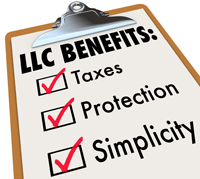|
New York Real Estate & Estate Planning Blog
Monday, March 14, 2016
 A limited liability company is a very popular business form that combines some of the best features of a corporation and a partnership. Like a partnership, an LLC is taxed through its individual members. Like a corporation, it provides limited liability to its members. In most situations, the personal assets of LLC members cannot be reached for the debts or liabilities of the business. But, also similar to a corporation, there are certain scenarios where personal assets can be reached. Most LLCs have more than one member. In recent years, a variation called the single member LLC has become widely used. As the name suggests, these LLCs have only one member. While the structure and organizational requirements of single member LLCs are essentially the same as ordinary LLCs, there has been some uncertainty as to whether these businesses afford their members the same type of limited liability. A limited liability company is a very popular business form that combines some of the best features of a corporation and a partnership. Like a partnership, an LLC is taxed through its individual members. Like a corporation, it provides limited liability to its members. In most situations, the personal assets of LLC members cannot be reached for the debts or liabilities of the business. But, also similar to a corporation, there are certain scenarios where personal assets can be reached. Most LLCs have more than one member. In recent years, a variation called the single member LLC has become widely used. As the name suggests, these LLCs have only one member. While the structure and organizational requirements of single member LLCs are essentially the same as ordinary LLCs, there has been some uncertainty as to whether these businesses afford their members the same type of limited liability.
Initially, not all states recognized single member LLCs. Now, all fifty states and Washington, D.C. recognize these business forms and have statutes governing them. Generally, single member LLCs provide personal asset protection to their members for the liabilities of the business. But, they do not always provide the reverse protection that a corporation or ordinary LLC includes. In the case of an ordinary LLC, the personal creditors of the member cannot go after that member’s share without what is referred to as a “charging order”. A charging order is a legal device that allows the creditor to place a lien on the member’s LLC interest. The member’s interest is essentially any distributions made to them by the LLC. Therefore, creditors can collect the members interest but not outright and not without jumping through a number of hoops. In the case of a single member LLC, the charging order protection may not be provided. While some states like Wyoming have specific laws making the charging order protection applicable to these types of businesses, other states, like California and New York, have made no decisions distinguishing ordinary LLCs from single member LLCs. Therefore, in these states it is important to remember that legislation and judicial decisions have the potential to cause serious problems for business owners in the future.
When wrestling with matters of business formation there are many factors that need to be considered and the advice of a seasoned business law attorney can help. Contact our office for a consultation today.
Monday, March 14, 2016

When someone dies without a will, it is known as dying intestate. In such cases, state law (of the state in which the person resides) governs how the person's estate is administered. In most states, the individual's assets are split -- with one third of the estate going to the spouse and all surviving children splitting the rest. For people who leave behind large estates, unless they have established trusts or other tax avoidance protections, there may be a tremendous tax liability, including both estate and inheritance tax.
For just about everyone, the cost of having a will prepared by a skilled and knowledgeable attorney is negligible when compared to the cost of dying intestate, since there are a number of serious consequences involved in dying without a proper will in place.
Legal Consequences
The larger your estate, the more catastrophic the consequences of dying intestate will be. If you die without a will, the freedom to decide how your property will be divided will be taken from you and the state in which you reside will divide your assets.
Not only will you not be able to decide on the distribution of your property, but a stranger will be making personal, familial decisions. This may be divisive among your family members; instead of leaving your loved ones in peace, you may leave them engaged in bitter disputes over a family heirloom or even a simple memento. This can be especially true in situations where there are children from a previous marriage.
Tax Consequences
In addition to the legal and personal problems associated with dying intestate, the tax results can be severe as well. This is particularly true for clients who have not consulted with an estate planning attorney in order to protect themselves through tax avoidance methods. Both the state and federal governments can tax the transfer of property and an inheritance tax may be imposed on the property you have left to your heirs.
The most effective way to avoid all of these negative tax consequences is to create a will with a competent attorney. Your lawyer will help you to choose a proper executor (the person who will administer your estate, distribute your property and pay your debts), and will assist you in finding ways to limit your tax liability. There are several ways your attorney can help you to do this:
- By gifting some of those you want to inherit before you die
- By creating one or several trusts
- By purchasing a life insurance policy
- By buying investments in your loved one's name
These methods will ensure that your loved ones receive the assets you desire them to have, while simultaneously protecting them from possibly enormous tax burdens after you pass.
For those who have no family, dying without a will can be even more troublesome and costly, since their entire fortunes can be left to the state. If a genealogical search doesn't turn up any blood relatives, all of your assets will be claimed by the government. This means that any individual, group, organization or charity you wished to endow will receive nothing.
It is never easy to think of one's own mortality, but it is even more painful to contemplate leaving a messy, uncomfortable situation behind when you pass. By engaging the services of an excellent estate planning attorney, who will help you fashion a legally binding, precisely designed document, you can make sure that your loved ones are well taken care of and that your final wishes are respected and implemented.
Monday, February 29, 2016

In this computer age, when so many tasks are accomplished via the internet -- including banking, shopping, and important business communications -- it may seem logical to turn to the internet when creating a legal document such as a will . Certainly, there are several websites advertising how easy and inexpensive it is to do this. Nonetheless, most of us know that, while the internet can be a wonderful tool, it also contains a tremendous amount of erroneous, misleading, and even dangerous information.
In most cases, as with so many do-it-yourself projects, creating a will most often ends up being a more efficient, less expensive process if you engage the services of a qualified attorney. Just as most of us are not equipped to do our own plumbing repairs or automotive repairs, most of us do not have the background or experience to create our own legal documents, even with the help of written directions.
Situations that Require an Attorney for Will Creation
In certain cases, the need for an estate planning attorney is inarguable. These include situations in which:
- Your estate is large enough to make estate planning guidance necessary
- You want to disinherit your legal spouse
- You have concerns that someone may contest your will
- You worry that someone will claim your mind wasn't sound at the signing
Mistakes and Omissions
It has always been possible to write a will all by yourself, even before the advent of the typewriter, let alone the computer. Such a document, however, is unlikely to deal with the complexities of modern life. Many estate planning attorneys have seen, and often been asked to repair, wills that have mistakes or significant omissions. These experts have also become aware of situations in which the survivors of the deceased wind up in court, spending thousands of dollars to contest ambiguously worded or incomplete wills. Without legal guidance from a competent estate planning attorney, creating a "boxtop" will can result in tremendous financial and emotional risk.
Evidence that Online Wills Are Not Foolproof
Evidence that many other complications can arise when an individual creates a will using generalized online directions can be found in the following facts:
- Each state has its own rules (e.g. requiring differing numbers of disinterested party signatures)
- Even uncontested wills can remain in probate if not executed in an exacting fashion
- Estate planning attorneys find legal software programs inadequate
- Even legal websites themselves recommend bringing in an attorney in all but the very simplest cases
- Some legal websites provide inexpensive monthly legal consultations with attorneys to protect their client and themselves
Areas that Frequently Cause Problems
Self-constructed wills often become problematic when the testator:
- Names an executor who has no financial or legal knowledge
- Leaves a bequest to a pet (legally, you must leave the bequest to an appointed caretaker)
- Puts conditions on payouts to an that are difficult, or impossible, to enforce
- Makes unusual end-of-life decisions or puts living will information into the will
- Designates guardians for children, but neglects to name successor guardians
- Neglects to coordinate beneficiary designations where, for example, the will and insurance policy designations contradict one another
- Leaves funeral instructions into the will since the document will most likely not be read until after the funeral has taken place
- Leaves inexact or ambiguous instructions dealing with blended families
- Neglects to mention small items in the will which, though of small financial value, are meaningful to loved ones and may cause contention
In order to ensure that you leave your assets in the hands of those you wish, and to avoid leaving your loved ones with bitter disputes and expensive probate costs, it is always wise to consult with an experienced estate planning attorney when making a will. In this area, as in so many others, it is best, and safest, to make use of those with expertise in the field.
Monday, February 15, 2016

As a minority business investor, it is essential to have an investment strategy that will maximize your returns. Once an investment decision is made, it is critical that a target business will enhance value of a broader investment portfolio. At the same time, many minority investors are also business owners who know what makes for a successful enterprise. This post is a discussion of what minority investors should look for in a privately held business.
What makes for a great minority investment?
Since a minority investor has a significant but non-controlling ownership interest in a business, the first rule of thumb is to invest in business enterprises that you understand and with which you are comfortable. At the same time, great investments can also be found outside your business comfort zone provided that you have good management skills and the acuity to understand your target's business model.
Investing in a small business starts at the top, that is with the owners. Accordingly, getting to know the owner and understanding how they do business is critical in your decision-making process. One key attribute you should look for in an entrepreneur is passion. Without it, he or she will lack the vision to steer the company toward success. It is also wise that you exercise caution by conducting background checks particularly with an eye toward ascertaining any legal actions in which the owner and other key people have been involved.
Of course, it's not only a matter of the people, it's about the numbers. The onus is on you to do your own due diligence, perform your own research and undertake an analysis of the proposed business plan. An investment proposal can be filled with numbers that amount to nothing more than smoke and mirrors. It's your job to ensure the numbers add up.
Level of Investment
Once you've done your homework on the target business, you need to decide how much to invest and how closely you will be aligned with the entity. Determining how much to invest is really a matter of risk management. In order to safeguard your investment, it is critical to negotiate a deal that is mutually beneficial. In particular, you should consider having an exit strategy with an understanding that your investment will be repaid by a certain date at an agreed upon rate of return.
You must also decide whether you will have no active participation in the decision-making and operations of the business or if you will be involved in the management of the entity. Even as a minority investor, your stake in the business may be significant enough to warrant having a seat at the table in order to advise on policy and evaluate management's performance.
Business Categories
As a minority investor, there are many business categories to consider that depend on your investment strategy. For example, investing in a start-up tends to be high-risk since management may not have a track record of success or a proven business model. Nonetheless, start-ups can also offer great rewards if they are breaking ground in a new business method or technology. The caveat is that the majority of start-ups are short-lived and destined for failure within the first 5 years.
If you are looking for a growth opportunity, there are business enterprises that have successfully launched but need another infusion of capital to grow. These businesses have an initial track record that will allow you to determine if your investment will be rewarded, even if it is subordinated to original investors. On the other hand, opportunities can also be found in companies that have stopped growing because of insufficient capital but still have a solid business plan.
For investors with a greater appetite for risk, companies that are failing can be ripe for a turn- around, provided that your stake comes with a hand in the decision-making and that the business fundamentals remain sound. Even bankrupt entities with cash flow potential offer investment opportunities for investors who are willing to have a high level of involvement.
The Bottom Line
For the minority investor, the nature of investing is high-risk, and every opportunity is unique - some offer greater rewards as well as higher risks. Your ability to make a decision on the merits of a business plan depends on your capacity to be a good business manager as well as a shrewd dealmaker. Investing in a privately held business requires a lot of up-front sweat equity in researching your target company, analyzing financial reports, evaluating the businesses track record, and ascertaining management's skills.
In particular, investing in a closely held business is an investment in the owners as well as the business. These entrepreneurs need to be innovative and have the ingenuity and passion to grow the business. In the final analysis, investors and owners need to be honest partners and strike a deal that is a win-win. The goal for both parties is to ensure the enterprise is successful and offers a worthwhile return on investment.
If you do your homework, your investment in privately-held businesses can be quite lucrative. That being said, it's always in your best interest as a minority investor to have a lawyer on your side of the table to craft an investment agreement, advise you of your responsibilities and shield you from potential litigation.
Monday, February 8, 2016

While the terms "estate tax" and "inheritance tax" are often used interchangeably, they are not synonymous. Let's try to clarify the difference.
Estate Tax
Estate tax is based on the net value of the deceased owner's property. An estate tax is applied to these assets when they are transferred to the beneficiary. It is important to remember that an estate tax doesn't have anything to do with the beneficiary or that person's resources.
Federal estate tax only affects individuals who die with more than $5.45[s1] million in assets and individuals with such large estates can leave that amount to their beneficiaries without being subjected to a tax liability. Ninety-nine percent of the population will not owe federal estate tax upon their death.
In most circumstances, no federal estate tax is levied against spouses. As of the Supreme Court's recent ruling, this includes gay married couples as well as heterosexual couples. Federal estate taxes can, however, be charged if the spouse who is the beneficiary is not a citizen of the U.S. In such cases, though, a personal estate tax exemption can be used. Even where remaining spouses have no liability for federal estate tax, they may be charged with state taxes in some states, taxes which cannot be avoided unless the couple relocates.
Inheritance Tax
Inheritance tax, as distinguished from estate tax, is imposed by state governments and the tax rate depends on the person receiving the property, and, in some locations, on how much that person receives. Inheritance tax can also vary depending upon the relationship between the testator and the benefactor. In Pennsylvania, for example, a spouse is not taxed at all; a lineal descendant (the child of the deceased) is taxed at 4.5 percent; a sibling is taxed at 12 percent, and anyone else must pay 15 percent.
Exemptions
There are exemptions that can reduce the amount of inheritance tax owed by significant amounts, but it is important that there be proper documentation of such exemptions for them to be applicable. Any part of the inheritance that is donated to charity does not require inheritance tax payment on the part of the beneficiary. Because of the inherent complexities of tax law and the variations from state to state, working with a tax attorney who has expertise with state tax laws s the best way to make sure you take advantage of any possible tax exemptions or avoidance.
Monday, January 25, 2016
 A 501(c)(3) nonprofit is one of a class of 29 different types of tax-exempt, nonprofit organizations under section 501(c) of the tax code. Most charitable organizations that receive donations from individuals in the United States are organized as 501(c)(3) nonprofits. The 501(c)(3) status is the most coveted type of nonprofit status because donations to these organizations can be deducted from income for tax purposes by the donors. This makes fundraising significantly easier.
501(c)(3) tax exemptions are reserved for businesses that operate for religious, scientific, literary, charitable, or educational purposes. They are also permitted when the organization provides services to test products for public safety, aims to prevent cruelty against children and animals, or fosters national or international amateur sporting competitions. A group trying to convince an American city to host the Olympics can be a 501(c)(3) even if it is not a charity in the traditional sense. In order to qualify as a religious organization, a church must comply with the rules outlined in IRS publication 1828 or risk losing its tax exempt status. All 501(c)(3) organizations are prohibited from engaging in supporting political candidates, and there are hard limits to the amount of lobbying a charitable organization may make to influence legislation.
To qualify as a 501c)(3), an organization must include in its articles of incorporation or bylaws restrictions on its power to operate for profit. Without this restriction, the organization’s tax exempt status will be denied, both by the Internal Revenue Service and by the state government. A 501(c)(3) company must receive a substantial portion of its funding by soliciting donations from the general public or government grants. If the organization raises most of its money by selling products or providing services, it cannot operate as a 501(c)(3), even if all the money raised is used for charitable purposes, though for small fundraisers, like carwashes or bake sales, exceptions may be permitted. An organization that receives significant income from private donations and government grants is called a public charity. Another type of 501(c)(3) is a private foundation, which is also tax exempt, and which may also receive tax-deductible donations. Private foundations, however, earn the bulk of their money through investments and endowments. This money is then donated to other charitable organizations.
Tuesday, January 5, 2016


Not every small business needs to form an LLC in order to function. A child selling lemonade by the side of the road has no use for a Tax ID number. It doesn’t seem practical to set up a new business entity to host a garage sale or a Tupperware party. As a venture starts to grow from a hobby to a full-time job, however, there are questions every business owner should ask to determine whether it is best to incorporate the business into a legal entity.
Do I need to protect my personal assets?
The greater the risk of being sued, the more necessary it becomes to file the necessary paperwork to form a Limited Liability company. This will limit the owner’s financial liability to the assets invested in the business. This means that, if a business gets sued, the business owner’s personal assets, like his or her home, automobile, personal bank accounts, and belongings, may not be targeted by the lawsuit. Common lawsuits of concern are for the satisfaction of contracts and leases and personal injury claims for accidents on the premises. Similarly, a bank may not seek a business owner’s assets to repay a loan unless the business owner signs a personal guarantee. Banks often require such a guarantee for new businesses that have no credit history.
Do I need flexibility in my obligation to pay income taxes?
A C corporation, which is a type of Limited Liability Company, has the flexibility to shift the business’s tax burden from one year to another. Normal business expenses and salaries can be deducted from a business’s taxes that may ultimately reduce a business owner’s tax burden depending on the income he or she derives from the business and from other sources.
Do I need to protect my company name?
In most states, companies register their names with the state to ensure that only one business can operate under that name. This is important for branding and marketing purposes. Adding LLC to the end of a company’s name can also add legitimacy to a new business, thus enhancing the brand.
Do I want to sell all or part of the business?
Ownership of an LLC or corporation can be shifted easily compared to those of a sole proprietorship. Adding partners and selling the business can be difficult if there are no lines between where the business ends and the owner begins. Once a business is incorporated, it lasts until it is dissolved, meaning it continues to be an asset for a business owner’s estate after the individual passes on.
Wednesday, December 30, 2015
 When a loved one dies, an already difficult experience can be made much more stressful if that loved one held a significant amount of debt. Fortunately, the law addresses how an individual’s debts can be paid after he or she is deceased.
When a person dies, his or her assets are gathered into an estate. Some assets are not included in this process. Assets owned jointly between the deceased and another person pass directly to the other person automatically. If there are liens on the property at that time, they will stay on the property, but no new liens can be placed on the property for debts in the name of the deceased. Similarly, debt jointly in the name of the deceased and another party may continue to be collected from the other party. In community property states, all assets and debts are the joint property of both spouses and pass automatically from one to the other. The community property states are Alaska, Arizona, California, Idaho, Louisiana, Nevada, New Mexico, Texas, Washington, and Wisconsin.
From the pool of assets in the estate, an executor is required to pay all just debts. This means that, before a beneficiary may receive anything, all debts must be satisfied. Property might be sold to create liquidity in order to accomplish this. If there are more debts than there are assets, the estate must sell of as many assets as possible to pay off the creditors. If there is no money in the estate, the creditor can not collect anything. Rather than force people into this tiresome process, many creditors will agree to discharge a debt upon receipt of a copy of a death certificate or obituary. This is particularly true of small, unsecured debts. Life insurance proceeds were never owned by the decedent and should pass to a beneficiary without consequence to the estate. Proceeds of a retirement account may also be exempt from debts.
If creditors continue harassing the beneficiaries of debtors, they may be violating federal regulations under the FDCPA. They can be held accountable by their actions, either by the FTC, the state attorney general, or a private consumer law attorney.
Monday, December 14, 2015

A tax basis is essentially the purchase price of a piece of property. Whenever that property is sold, the seller must pay taxes on the difference between the sale price and the original purchase price. This concept applies to all property, including stocks, bonds, vehicles, mechanical equipment, and real estate. If debts are assumed along with the purchase price, the principal amount of the debt will be included in the basis. The basis can be adjusted downwards when a person deducts depreciation costs on his or her income tax returns, and may be increased for capital investments towards improving the property that are not deducted for income tax purposes. Selling a property that has been held for a long time can carry a serious tax burden because of inflation, particularly when real estate prices have increased.
When an individual receives property as an inheritance, the tax basis is reset to whatever the fair market value is at the time of the transfer of title. This means that the heir would pay significantly less taxes if that property is sold by the beneficiary than if the original owner were to sell it and devise the money to his beneficiaries. Most simple wills provide that all of a testator’s assets are placed into a residual estate to be divided equally among the heirs. This means that an executor must liquidate the assets of the estate and divide the proceeds among the heirs. However, because there is no transfer of title before the property is sold, the heirs are stuck with the grantor’s basis and they lose an opportunity for a sizeable tax break.
A person planning his or her estate may also reset the basis in his or her property by giving it as a gift directly to his or her heirs or by gifting the property to an inter vivos trust. These actions can have their own tax related consequences, or create other unintended problems for the beneficiaries. Only an experienced estate planning attorney can advise you on the most efficient way to pass your assets on to your heirs.
Monday, December 14, 2015

Automobile deductions: Whether an individual uses a personal vehicle for his or her own business or company owns a vehicle, the depreciation of value and costs associated with that vehicle may be deducted from the company’s income at year's end. A taxpayer must keep track of all of these expenses and document them by maintaining receipts and records of expenditures in order to claim the deduction. Alternatively, a business may declare standard deductions for the vehicle based on the mileage of the vehicle. In 2015, this standard deduction is 57.5 cents for every business mile driven. If a vehicle is driven for both business and personal use, the IRS will require a taxpayer to identify the percentage of use dedicated to business.
Capital expenses: Also called startup costs, the IRS allows a business to deduct up to $5,000from its income in its first year of expenses for expenditures made before the doors of the business opened. Any capital expenses remaining after the first $5,000may be deducted in equal increments over the next 15 years.
Legal and professional fees: Fees paid to professionals like lawyers, accountants, and consultants, may be deducted from a company’s income each year. If the benefit of a professional’s advice is spread out over a number of years, the tax deduction must also be spread equally over the same period. The cost of books or tuition for classes to help avoid legal or professional costs may also be deducted.
Bad debt: A business may deduct the losses suffered as a result of a customer who fails to make payment for goods sold. However, a business that deals in providing a service may not deduct the time devoted to a client or customer who does not pay. A service business may deduct expenses made in an attempt to help that customer or client.
Business entertaining:The cost of meals or entertainment purchased for business purposes must be documented by receipts in order to maintain the right to deduct the cost from income for tax purposes. Only 50 percent of the total cost of entertainment expenses may be deducted.
Interest: If a business operates on a business loan or a line of credit, the interest on that loan may be deducted from income for tax purposes.
Normal business expenses: The cost of advertising, new equipment, depreciation of existing equipment, moving expenses, business cards, office supplies, travel expenses, coffee and beverages, software, casualty and theft losses, postage, business association dues, and all other business expenses can be deducted.
Monday, December 7, 2015
 The law allows a person preparing a will to have almost complete control over his or her assets after the testator passes on, but there are limits to such power. A person can restrict a property from being sold, or make sure that it is used for a specific purpose. A property can be bequeathed to a family member as long on condition that the person maintains the family business in a specific city, or exercises daily, or places flowers on the deceased's grave every week, or engages in any other behavior the testator desires. This freedom, however, is not without limits. The time limit on this ability is called the rule against perpetuities. The rule is also referred to as the “dead man’s hand” statute.
The rule against perpetuities is complex and rarely utilized. At the time of the passing of the testator, the heirs of the estate are locked in. These heirs are referred to as “lives in being.” For the purposes of this rule, if a child is conceived but not yet born at the time of the testator’s death, it will be considered a life in being. Once the last living heir named in the will passes away, the restrictions on the property will continue in place as the testator desired for 21 years. The idea is that a testator may control his assets for a full generation after his or her death. The rule is notoriously difficult to apply properly. When it does apply, the conditions on the bequest are abandoned and the gift returns to the residual estate.
What makes this rule so confusing is that, when an individual writes a will, he or she may make gifts to potential children or grandchildren. These children and grandchildren, however, may not be born until years later. If a child has been born at the time the decedent passes away, he or she is subject to the restrictions on the bequest during his or her lifetime. If a grandchild is conceived and born after the decedent’s death, however, the child may avoid the restrictions 21 years after the death of the last heir alive at the time of the decedent’s death. There is no way to predict when this might occur. The rule is archaic and easily avoided. A knowledgeable attorney can help a person planning his or her estate set up an equitable trust. Similar to a will, a trust may impose conditions on the use of assets, but is not subject to the rule against perpetuities. There are other advantages to a trust, but one of the most important is avoiding this unpredictable and confusing rule.
John P. Rosenblatt, Attorney at Law assists clients in Nassau County, Suffolk County, the Five Boroughs, the NY Metro Area, Westchester County, Putnam County, Orange County, Dutchess County and Rockland County.
|

|
|
|